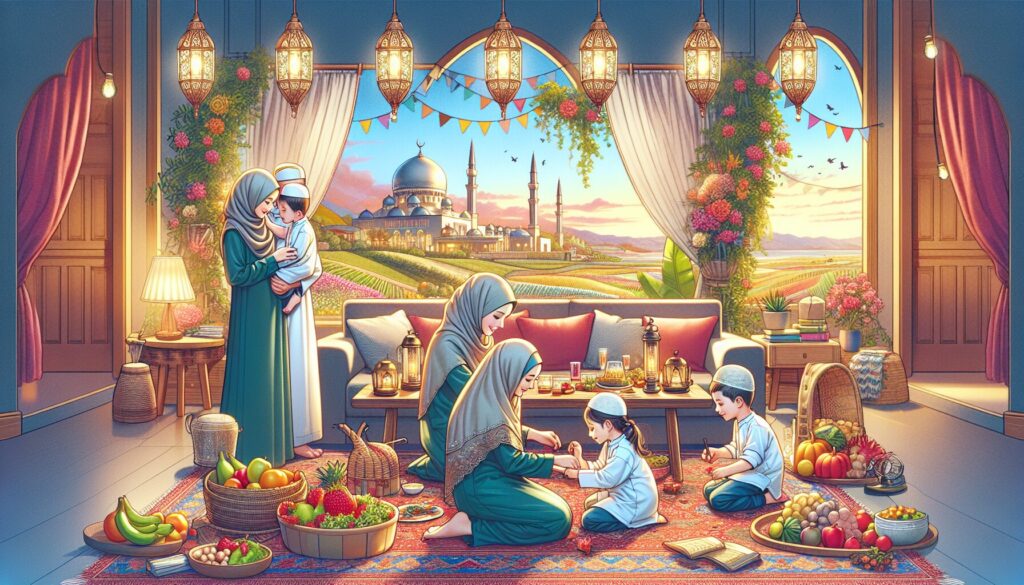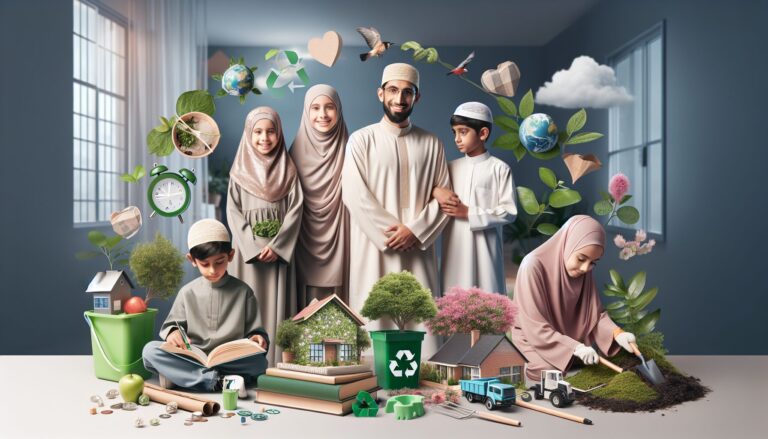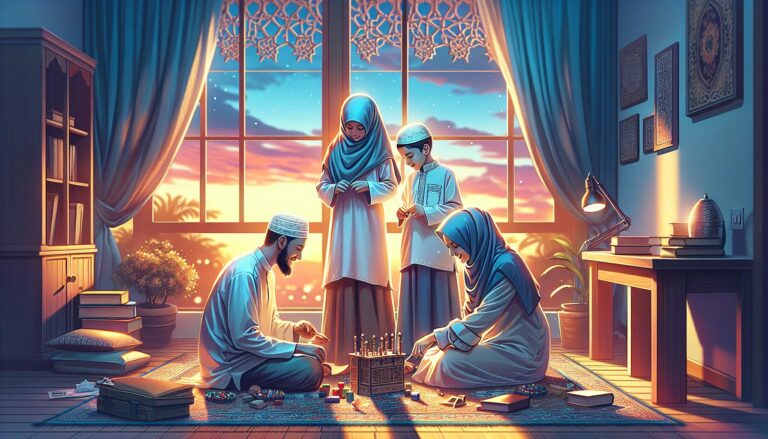Last week, my four-year-old nephew asked me why we couldn’t eat his favorite biscuits during the day, and it hit me – finding engaging Ramadan activities for preschoolers here in Aotearoa can be quite the adventure! As Muslim families across New Zealand prepare for this blessed month, it’s clear that keeping your little ones connected to their faith while they’re too young to fast requires some creative Kiwi ingenuity. Whether you’re in Auckland, Wellington, or anywhere in between, there’s something magical about watching preschoolers grasp the spirit of Ramadan through hands-on activities that speak to their curious hearts. From crafting moon phase calendars with shells from New Zealand’s beautiful beaches to organizing mini charity drives with their kindy friends, your tamariki can participate in meaningful ways that build lasting memories and strengthen their Muslim identity, even while living thousands of kilometers from traditional Muslim-majority countries.
Interactive Ramadan Story Time and Book Recommendations
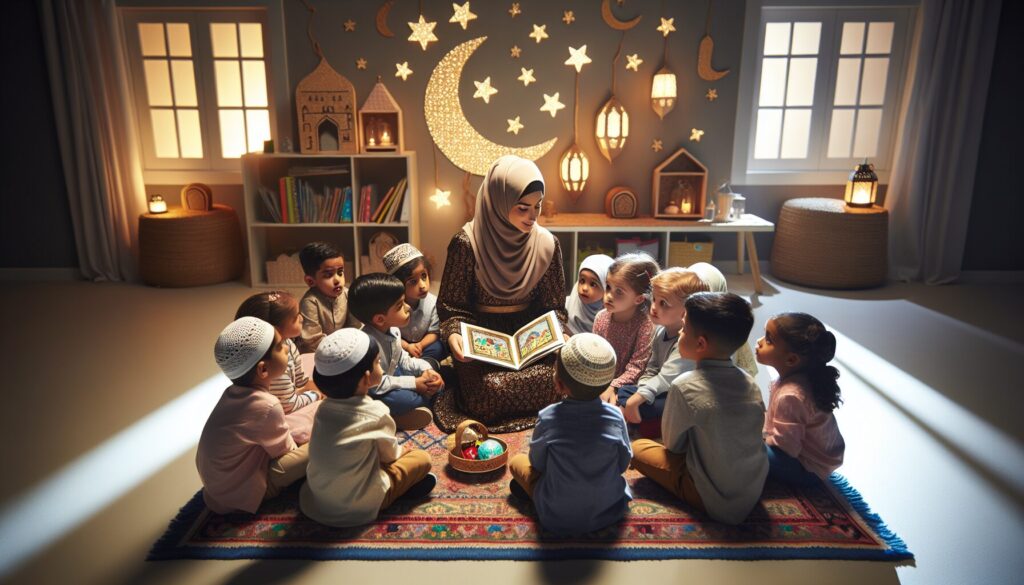
Story time becomes magical when you’re bringing Ramadan tales to life for your little ones! I’ve found that interactive storytelling is one of the most engaging Ramadan activities for preschoolers, especially when you add voices, props, and plenty of enthusiasm. Trust me, after years of reading to my own children and their friends, I’ve learned that the secret is making every character come alive with different voices and letting the kids join in with sound effects.
Creating an interactive experience means going beyond just reading aloud. Use simple props like a crescent moon cutout, dates in a bowl, or a small prayer mat to make the stories tangible. When you’re telling the story of the first revelation, let children hold a pretend lantern while you describe the cave of Hira. Furthermore, encourage them to act out parts of the story – they can pretend to break their fast when characters in the book do, or make the call to prayer sounds together.
The best part about living here is access to wonderful local libraries that now stock diverse children’s books. Auckland Libraries has expanded their collection significantly, and you’ll find gems tucked away in the children’s section. Additionally, Whitcoulls often carries international titles that might surprise you.
Must-Have Books for Your Ramadan Collection
Start your collection with “The Best Eid Ever” by Asma Mobin-Uddin – it’s perfect for explaining the joy of celebration to preschoolers. The illustrations are vibrant, and there’s a lovely subplot about sharing that resonates with Kiwi values of community. Another favourite that works brilliantly is “Under the Ramadan Moon” by Sylvia Whitman, which uses simple rhymes that preschoolers can memorize and recite along.
For younger preschoolers, board books work wonders. Consider these engaging options:
- “Ramadan Kareem” by M. O. Yuksel features lift-the-flap elements that keep tiny hands busy
- “My First Ramadan” by Karen Katz uses bright colours and simple text perfect for 2-3 year olds
- “Hassan and Aneesa Love Ramadan” offers repetitive phrases that help with language development
- “The Ramadan Lantern” by Twinkl is available as a free download and can be printed at home
However, don’t limit yourself to published books. Creating your own family Ramadan story book is incredibly special. Use photos from your own iftar gatherings, drawings your preschooler makes, and simple sentences they help compose. Local print shops like Warehouse Stationery can spiral bind these homemade treasures for under ten dollars.
Time your story sessions strategically – right after Asr prayer works wonderfully as children aren’t too hungry yet but are winding down from afternoon activities. Keep sessions to 15-20 minutes maximum, as preschooler attention spans are limited. Therefore, choose one main story and perhaps one short poem or nasheed to end with.
Remember to make connections to their everyday life in New Zealand. When reading about dates, mention how they’re available at Pak’nSave now, or when discussing charity, talk about the food bank at your local mosque. These familiar references help preschoolers understand that these beautiful traditions happen right here in their own community, making the stories feel real and relevant to their world.
Simple Cooking Projects to Prepare for Iftar Together
Getting little hands involved in iftar preparation creates some of the most precious memories you’ll make during this blessed month! I’ve discovered that preschoolers absolutely love feeling like they’re contributing to the family meal, and there’s something magical about watching their faces light up when everyone enjoys something they helped create.
The key to successful cooking with preschoolers is choosing tasks that match their developmental abilities while keeping everything safe and fun. Think of it like building blocks – you’re laying the foundation for both culinary skills and beautiful traditions they’ll carry throughout their lives.
Age-Appropriate Kitchen Tasks That Build Confidence
Three and four-year-olds can handle more than we often give them credit for! Here are the tasks that work brilliantly:
- Washing fruits and vegetables in a basin of water
- Tearing lettuce leaves for salads
- Stirring cold ingredients in large bowls
- Arranging dates on serving plates
- Sprinkling toppings on dishes
- Using cookie cutters on rolled dough
A friend mentioned her daughter loves using her special pink apron from The Warehouse whenever she helps prepare iftar. Always supervise closely and keep sharp objects and hot surfaces completely out of reach. Setting up a designated “preschooler prep station” on the dining table works wonderfully – it keeps them away from the stove while still feeling part of the action.
One of my favorite Ramadan activities for preschoolers involves making date balls. Simply let them help mash pitted dates with a fork, then roll the mixture with crushed biscuits and desiccated coconut. These no-cook treats are perfect for tiny hands and make a nutritious iftar starter that’s naturally sweet.
Furthermore, consider preparing fruit kebabs together. Provide pre-cut pieces of kiwifruit, strawberries, and grapes, then let your preschooler thread them onto blunt skewers. The patterns they create often surprise you with their creativity! Local seasonal fruits from Pak’nSave work beautifully for this activity.
Making sandwiches offers another excellent opportunity for involvement. Preschoolers can spread hummus or labneh using plastic knives, add cucumber slices, and even use shape cutters to create fun designs. These simple tasks help develop fine motor skills while contributing meaningfully to the family meal.
Additionally, preparing drinks together teaches measuring and pouring skills. Let them add water to cordial or help squeeze lemons for fresh lemonade. Using clear measuring cups helps them see the quantities, turning it into a gentle math lesson too.
The sense of pride children feel when the family breaks their fast with something they helped prepare is truly priceless. You’re not just making food together – you’re building understanding about why we fast and feast while creating bonds that strengthen with each shared moment in the kitchen.
Making a Preschooler-Friendly Ramadan Calendar and Countdown
Creating a visual countdown makes the holy month tangible and exciting for little ones who can’t quite grasp the concept of time yet. You’re basically turning abstract days into something they can see, touch, and interact with every single morning – and trust me, it’s become a favorite Ramadan activity for many families, especially since a friend started doing this with her nephew!
The beauty of making your own calendar lies in its flexibility to match your child’s developmental stage. Start with a simple paper chain where each link represents one day, letting your preschooler tear off a link each morning after Fajr prayer. Many families find that using alternating colors – perhaps green and gold – helps children visualize the passing days while reinforcing those special Islamic colors they’ll see at the mosque.
For children who love stickers, create a large poster board with 30 boxes drawn on it. Each box becomes a mini adventure waiting to happen. Your preschooler can place a star sticker in one box each evening after breaking fast together, building anticipation for the next day’s square. Additionally, you might include small drawings or photos representing special activities planned for certain days – maybe a picture of grandma for the day she’s coming to share iftar, or a crescent moon for when you’ll be moon-sighting for Eid.
Interactive Elements That Spark Daily Excitement
Transform your calendar into an interactive learning tool by incorporating pockets or envelopes for each day. Inside these little treasures, you can hide:
- Simple good deed suggestions written on colorful paper (share a toy, help set the table, give someone a hug)
- Mini chocolate coins or halal lollies for after iftar
- Small Islamic stickers or temporary tattoos
- Picture cards showing different mosques around New Zealand
- Tiny notes with age-appropriate hadith or duas written in both English and Arabic
The Islamic Centre of New Zealand often provides free downloadable resources that you can print and cut out for these daily surprises. Furthermore, many local Muslim communities share printable materials through their social media pages during this blessed month.
Consider adding a “gratitude jar” component to your calendar system. Every day, your preschooler can draw or dictate something they’re thankful for, then pop it into a decorated jar. By Eid, you’ll have 30 beautiful moments to read together – it’s like creating your own family’s gratitude story! A lovely tradition started by some families involves a gratitude jar… Their kids now ask about the jar weeks before the month even begins.
Weather tracking adds another engaging layer, especially given New Zealand’s autumn conditions during most years. Your little one can draw simple weather symbols – sun, clouds, rain – creating their own meteorological record of the month. This helps them understand that while Muslims worldwide are fasting together, everyone’s experiencing different seasons and weather patterns.
Therefore, positioning your calendar at your child’s eye level proves crucial for maintaining their engagement. The hallway between bedrooms often works brilliantly, or perhaps on the back of their bedroom door where they’ll see it first thing each morning. Some families I know through Federation of Islamic Associations of New Zealand have created dedicated “Ramadan corners” in their homes where the calendar becomes the centerpiece of a larger display including prayer mats, children’s Islamic books, and special decorations.
Decorating Your Home with Child-Made Ramadan Decorations
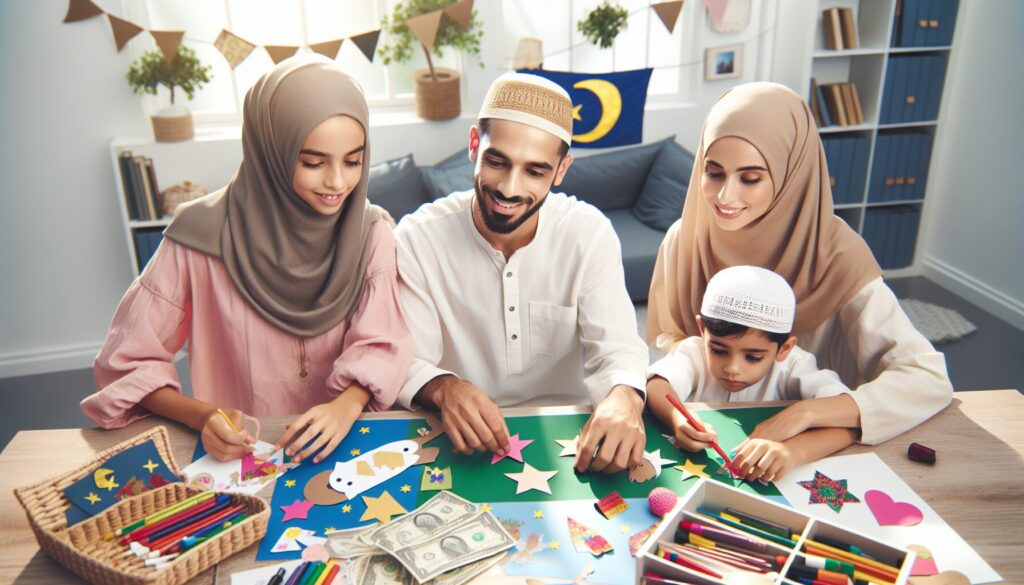
You’re going to love how excited your little ones get when they see their own artwork brightening up every corner of your home! There’s something magical about watching preschoolers’ faces light up when they spot their handmade crescent moon hanging in the lounge or their colorful lantern swaying from the ceiling fan. I’ve found that involving children in creating decorations not only keeps them engaged but also helps them feel like they’re truly part of the celebration.
Paper plate crescents and stars make fantastic Ramadan activities for preschoolers, and they’re so simple to create. Your child can paint paper plates in metallic gold or silver (you can find these at Warehouse Stationery for just a few dollars), then you’ll help them cut out the crescent shape. Additionally, cutting star shapes from cardboard and covering them with aluminum foil creates a stunning effect when they catch the light from your windows.
Safety tip: Always supervise children when using scissors, even child-safe ones, and do the cutting yourself for children under four.
Furthermore, creating a special Ramadan banner becomes an annual tradition your family will treasure. Here’s what works brilliantly with preschoolers:
- Cut triangle shapes from colored paper in green, gold, and white
- Let your child decorate each triangle with stickers, stamps, or drawings
- String them together using wool or ribbon
- Hang the banner across your dining room where you’ll gather for iftar
- Add glitter glue dots for extra sparkle (though be prepared for glitter everywhere!)
Creating a Ramadan Tree Display
A family I know in Ponsonby started a Ramadan tree tradition that’s caught on with several families in their community. You’ll need a large branch from your garden (or grab some fallen ones from Cornwall Park during your next visit), spray paint it white or gold, and place it in a pot filled with stones. Your preschooler can then create ornaments using air-dry clay, pressing cookie cutters into rolled clay to make moons, stars, and mosque shapes.
However, the most cherished decorations often come from the simplest materials. Toilet paper roll lanterns transformed with tissue paper and LED tea lights create a warm glow without any fire hazard. Your child can wrap the rolls with colored tissue paper, punch holes to create patterns, and you’ll be amazed at how professional they look lined up along your windowsill.
Therefore, I always recommend setting up a dedicated craft station during the month where materials stay accessible. A plastic tablecloth from The Warehouse, some containers for supplies, and child-safe scissors mean your preschooler can create whenever inspiration strikes. This independence builds their confidence while giving you moments to prepare meals or simply enjoy watching their creativity bloom.
Remember to date and save at least one decoration each year – you’ll cherish looking back at how their artistic skills developed as they grew.
Teaching Kindness Through Age-Appropriate Charity Projects
Teaching little ones about charity during this special month doesn’t have to involve complex concepts – it’s actually one of the most rewarding Ramadan activities for preschoolers you can do together! I’ve found that when we break down sadaqah (charitable giving) into bite-sized, hands-on projects, our tiny helpers absolutely light up with excitement.
Start with what preschoolers understand best: sharing. Create a “Kindness Jar” where your child can place a marble or sticker each time they share a toy, help a sibling, or do something nice for someone. Once the jar fills up, let them choose a charity project to complete. This visual representation helps them connect their daily actions with the bigger picture of helping others.
Making charity tangible for small hands is crucial. Set up a special corner in your home as a “Giving Station” where your preschooler can sort items for donation. Let them decorate a box with Islamic patterns and crescents, then fill it with gently-used toys they’ve outgrown. The Salvation Army has drop-off points throughout the country that welcome these donations year-round.
Hands-On Projects That Build Empathy
One project that works brilliantly is creating “Blessing Bags” for those experiencing homelessness. Your preschooler can help fill small bags with items like:
- Granola bars and packaged snacks (check they’re halal!)
- Small bottles of water
- Warm socks from The Warehouse
- Travel-sized toiletries
- Hand-drawn pictures with kind messages
Keep these bags in your car and when you’re out and about in Wellington or Christchurch, your child can help distribute them with your supervision. This direct action helps them understand that charity isn’t abstract – it’s about real people who need help.
Furthermore, organizing a mini food drive specifically for your local mosque’s food bank teaches community responsibility. Give your preschooler their own shopping list with pictures of items like rice, canned goods, and pasta. During your regular grocery shop at Pak’nSave or Countdown, let them be in charge of selecting and placing these items in the trolley. They’ll feel so proud knowing “their” food will help families during iftar.
Another beautiful tradition I’ve started with my four-year-old is the “Gratitude and Giving Board.” We divide a poster board in half – one side for things we’re grateful for (drawn or cut from magazines), and the other for ways we can help others. Each evening before bedtime, we add one item to each side. This visual reminder helps reinforce that when Allah blesses us with something, we should share those blessings.
Additionally, consider partnering with KiwiHarvest to volunteer as a family at their food rescue events. While the actual volunteering might be too advanced for preschoolers, they can help sort fruits at home that you’ve collected, washing apples or arranging them in boxes. Always supervise closely and choose age-appropriate tasks that don’t involve sharp objects or heavy lifting.
Remember to celebrate these acts of kindness! Create a special “Charity Champion” certificate for your preschooler after each project. Take photos of them doing their charitable work and create a special album they can look through. This reinforcement helps establish charity as a joyful, regular part of their life rather than a one-time activity.
Conclusion
In essence, creating meaningful Ramadan experiences for your preschoolers here in New Zealand doesn’t require elaborate plans or expensive materials – it simply needs your time, creativity, and willingness to adapt beautiful Islamic traditions to your Kiwi lifestyle. From the gentle rustle of handmade paper lanterns in your Auckland flat to the excited chatter of little voices planning their next charity project in Wellington, these simple activities weave threads of faith, culture, and community into the fabric of your child’s earliest memories. Through interactive storytelling, hands-on cooking, creative crafts, and age-appropriate acts of kindness, you’re not just keeping your little ones busy during the blessed month – you’re planting seeds of understanding, empathy, and spiritual connection that will bloom throughout their lives, proving that distance from traditional Muslim lands means nothing when hearts are close to faith. May your home be filled with giggles and blessings this Ramadan!
Continue Exploring
Ready to transform prayer time into an engaging adventure for your children? Discover the proven techniques that make Islamic prayer exciting and meaningful for young minds through the power of gamification.
Frequently Asked Questions
What age group is most suitable for these Ramadan activities, and can younger siblings participate?
These activities are designed primarily for preschoolers aged 3-5 years, though many can be adapted for younger children. For 2-3 year olds, focus on simpler tasks like washing fruits, tearing lettuce, or placing stickers on calendars. Always supervise closely and choose age-appropriate tasks – for instance, children under four should have adults do any cutting, even with child-safe scissors. Many activities like story time and decorating can involve the whole family, with older siblings helping younger ones participate safely.
How can I find halal ingredients and Islamic books for these activities in New Zealand?
Finding halal ingredients and Islamic resources in New Zealand is easier than ever. Major supermarkets like Pak’nSave and Countdown now stock halal-certified products, especially in areas with larger Muslim communities like Auckland and Wellington. For Islamic children’s books, Auckland Libraries has significantly expanded their collection, and Whitcoulls often carries international titles. The Islamic Centre of New Zealand and Federation of Islamic Associations of New Zealand provide free downloadable resources. Local mosques often have small libraries or can recommend where to purchase books. For craft supplies, The Warehouse and Warehouse Stationery stock everything you need for the decoration and calendar activities.
How long should each activity last to keep preschoolers engaged without overwhelming them?
Preschoolers have limited attention spans, so timing is crucial for successful activities. Story time sessions should last 15-20 minutes maximum, ideally scheduled after Asr prayer when children aren’t too hungry but are winding down. Cooking projects work best in 10-15 minute segments, focusing on one or two simple tasks at a time. Craft activities can extend to 20-30 minutes if children are engaged, but have materials ready and be prepared to pause if interest wanes. The daily calendar interaction should take just 2-3 minutes each morning. Remember, it’s better to have shorter, successful sessions that leave children wanting more than to push through when they’re losing focus.
Fatima Ansari is an Islamic educator and writer with over a decade of experience teaching Quran and Islamic studies to children and families in Western Muslim communities. Growing up in North America, she saw firsthand the challenges Muslim families face in balancing faith with modern life, which inspired her to share practical guidance rooted in the Quran and Sunnah. Her mission with E-Quran Learning is to make Islamic education accessible, relatable, and inspiring for Muslim families across the United States, United Kingdom, Canada, Australia, and New Zealand.
